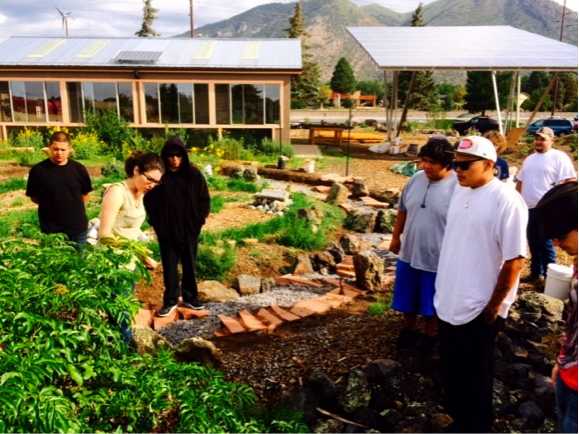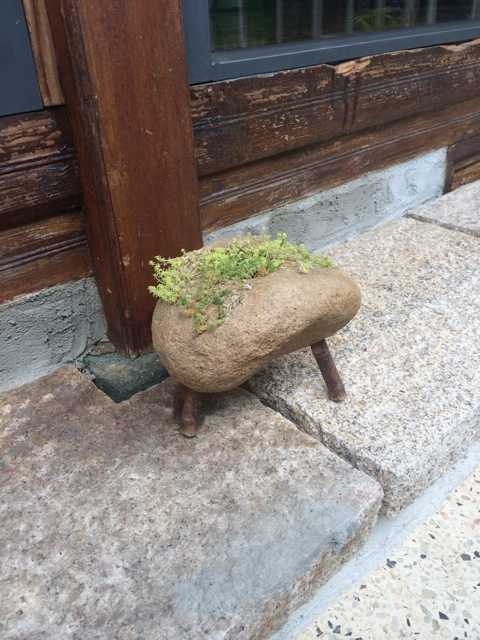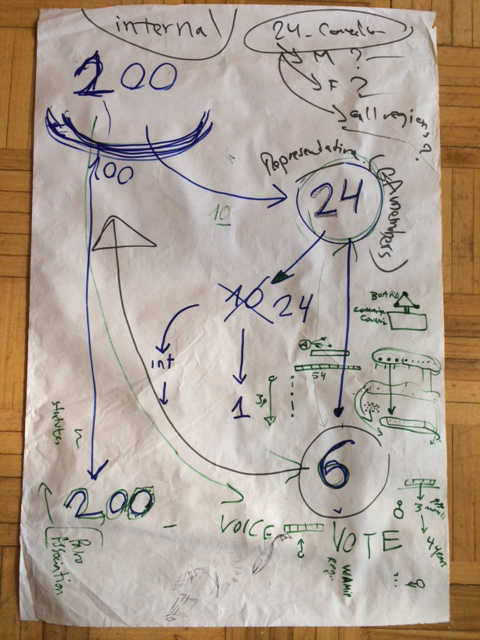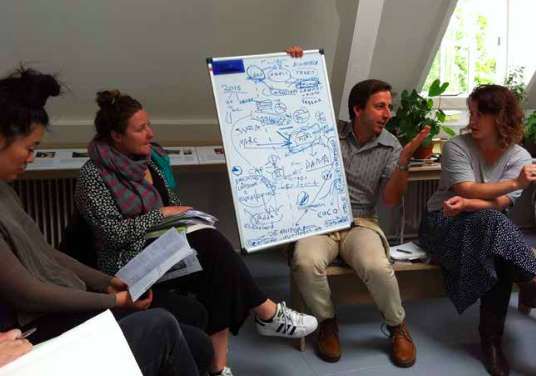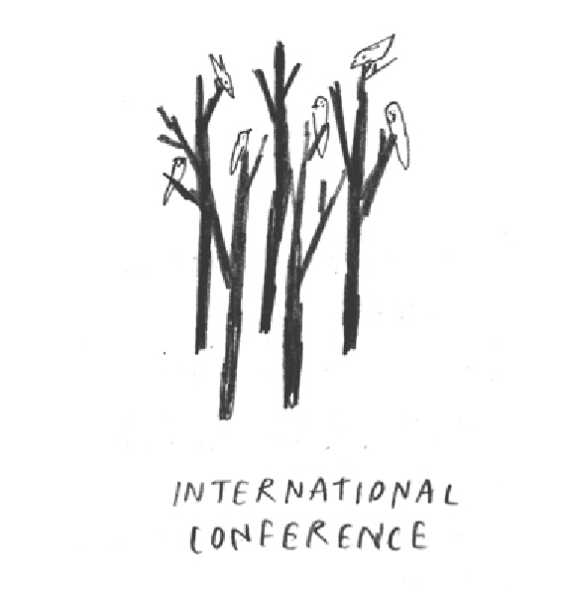COOP Academy ~ INLAND class From Month to Month
Youngsters listening to herbalist during a visit of the Herb Bus’s 2014 West Coast Tour to the Ponderosa High School in Flagstaff, Arizona.Herb Bus provides free clinical care, tea and herbal education to underserved communities. Building community through herbalism, this mobile herb clinic provides herbal first aid and earth-based constitutional medicine. Currently hubbed in Atlanta, Georgia. The Herbalista Free Clinic, traveling via the Herb Bus, also serves as a mobile classroom.
Seminar 6: On Un/Common Ground
Convened by artist Fernando García-Dory, a collaboration between INLAND, Casco, and the Dutch Art Institute
Taking place as part of the Dutch Art Institute’s off-Sonsbeek program during the opening week of SONSBEEK ’16: transACTION
Sonsbeek Park, Arnhem
Casco, the Dutch Art Institute (DAI), and INLAND invite you to the first gathering of INLAND Nederland, the official launch of INLAND in the Netherlands. Initiated by artist Fernando García-Dory, INLAND is a “para-institutional“ art praxis that aims to understand and interact with ecological and territorial dynamics between the urban and rural with a particular focus on agro-ecological knowledge, farmer struggles, and art practices in such contexts.
As the first official manifestation and embedding of this practice in the Netherlands, after the introduction of INLAND at Casco last year, the gathering acts as an occasion for the convergence of those who could constitute INLAND Nederland. The aim of which is to collect and draw a topographical survey of urgent INLAND questions pertaining to sites specific to the Netherlands.
In this context, the current participant artists of INLAND Class at DAI will share their artistic research both in individual and collective forms throughout the gathering. The gathering will also be a celebratory moment to launch the publication INLAND Volume: Publishing Class V, where case studies of various rural-cultural actions taking place across the world are filed. The publication is the outcome of the class led by Casco and INLAND at DAI last year, in collaboration with Werkplaats Typografie.
Please note that the gathering, which is part of DAI’s off-Sonsbeek program, is open to the public and will be hosted at a designated tent in the middle of Sonsbeek Park, coinciding with the public opening of SONSBEEK ’16: transACTION. While the afternoon program, between 15:00–21:00 hrs, is open to the public, the morning program, between 10:00–14:00 hrs, and the evening’s dinner afterwards, are by registration only. So please make sure to rsvp in advance by sending an e-mail to coordination_nl@inland.org.
Seminar 5: Seedlings
Present: Mali Boomkens, Binna Choi, Rick van Dolphijn, Henk Eshuis, Fernando García-Dory, Sanne Oorthuizen and the inhabitants of eco-village Ppauw
Image: Stone garden element in traditional Korean country house. Photo by FGD.
Thursday 28 April at eco-village Ppauw
Please make sure to bring clothing and shoes in which you can work on the land
10.00 hrs Meet at Arnhem Centraal Station main entrance and take a bus to eco-village Ppauw (bus stop: “Wageningse Berg”)
11:00-12:30 Introduction to eco-village Ppauw by Henk Eshuis and Mali Boomkens and do some work together!
12:30-13:30 Lunch
13:30-15:30 Lecture by Rick Dolphijn: “Ecosophy: what is the matter with the earth?”
15:30-16:30 Fernando García-Dory introduces concept of June INLAND Nederland gathering (Sonsbeek park, 4 June 2016)
16:30-17:30 Collective discussion artistic interventions and contribution INLAND Class to INLAND Nederland gathering 4 June
17:30-18.30 Dinner
18.30-19.30 Bus back to Arnhem
19:30-21:00 Collective discussion continued
Friday 29 April at DAI
10:00-13:00 Face-to-face meetings with Fernando García-Dory and Sanne Oorthuizen
13:00-14:00 Lunch
14:00-17:00 Face-to-face meetings continued
As Spring is here, we will celebrate her by means of a visit to the countryside, particularly to a recent initiative called eco-village Ppauw [ecodorp Ppauw]. During the day, we will balance internal discussions with getting to know and do some actual work on the land. Please make sure to bring adequate clothing and shoes.
Ppauw is an eco-village built on the principles of permaculture and will host the first Permaculture Gathering in the Netherlands from 6-8 May 2016. Next to learning from and together with eight inhabitants of Ppauw (6 adults, 2 children), we will extend our theoretical framework with a lecture on new materialism by dr. Rick Dolphijn; amongst others Senior Fellow Centre for the Humanities, assistant professor Media and Culture Studies at Utrecht University and member of the Institute for Cultural Inquiry. Together with Iris van der Tuin he wrote New Materialism: Interviews and Cartographies (2012). This book includes interviews with scholars such as Rosi Braidotti and Karen Barad (whose writings on Entanglement we discussed with Kathrin Thiele earlier in the program).
The rest of the day we will continue our dialogue about the INLAND Nederland gathering planned for 4 June 2016 in the Sonsbeek Park, where participants of INLAND Class will have an active role. We will be able to discuss in depth during the face-to-face meetings on Friday 29 April.
Reading material
- Rick Dolphijn, Tsz Man Chan, “Postanimalism”, Posthuman Glossary (2015)
- Rick Dolphijn, “Ecosophy”, Posthuman Glossary (2015)
- Rick Dolphijn, Tove Kjellmark, “Technoanimalism”, Posthuman Glossary (2015)
- Rik Dolphijn, Iris van der Tuin, “The Transversality of New Materialism”, Women: A Cultural Review (2010). Available via: http://www.rickdolphijn.nl/wp/wp-content/uploads/2014/07/Dolphijn-Van-der-Tuin-2010-The-Transversality-of-New-Materialism.pdf
Seminar 4: Defining the subject
Present: Elske Hageraat, Fernando García-Dory and Sanne Oorthuizen
Image: Agreement on internal organization adopted by consensus after a seven hours meeting of the World Alliance of Nomadic Peoples, Mera, Gujarat, India, 2010. Photo by Fernando García-Dory.
Thursday 17 March at DAI, Arnhem
12.00–13.00 hrs Lunch at DAI
13.00–15.00 hrs Talk by Elske Hageraat (Boerengroep)
15.00- 15.30 hrs Questioning of reading materials
15.30-16.00 hrs Tea and coffee break
16.00–18.30 hrs The internal structure of INLAND by Fernando García-Dory
18.30–19.30 hrs Dinner at DAI
19.30–21.00 hrs Continuing the INLAND conversation & group discussion about final project presentation
Friday 18 March at DAI, Arnhem
10.00–12.00 hrs Face to face meetings with Fernando García-Dory and Sanne Oorthuizen
12.00–12.45 hrs Lunch at DAI
12.45–16.00 hrs Face-to-face meetings cont'd
After investigating food geopolitics, Agroecology, Entanglement and queer theory, the March session of INLAND Class will revolve around two specific rural practices, with the aim to start a tentative exercise to try to collectively define what could be the role of art and how it could operate in constituencies in their respective contexts. It will help us define specific social subjects; get to know their working methods, problematics and visions. Because it is in the backend, in maintenance, in the administration and bureaucratic systems, we can discern not only a project’s ethics but also its aesthetics.
On Thursday 17 March, we will welcome guest tutor Elske Hageraats, coordinator of the Dutch Farmers Foundation (Boerengroep). Since 1971, Boerengroep aims to connect the university with the reality and challenges of farmers and peasants and to stimulate students (the future researchers and policy makers) to develop a critical view on the food production chain. Elske is also involved in Toekomstboeren, a group of “future farmers” who inspire young people to start working the land again, and she is working in organic garden de Ommuurde Tuin in Wageningen. With Elske, we will talk about the Dutch farming situation and how agricultural practices are being and can be commoned. Subsequently, INLAND Class core tutor Fernando García-Dory will share the less visible context of INLAND, amongst others its legal, economic and community structures. How are relationships made and maintained, how is the INLAND community organized and with what underlying common “rules and regulations”?
During the face-to-face meetings on Friday 18 March, we will talk about the projects each of the participants is developing for INLAND Class and how these will be presented during the June collective seminar.
Reading material
- Franco Ingrassia, “El Prologo del libro”, Aesthetics Dispersion [set of texts based on papers delivered at three conferences held between 2009 and 2010 at the Parque de España Cultural Centre in the city of Rosario, Argentina].
Seminar 3: Touching -the land- a perspective from feminism and Quantum physics
Present: Kathrin Thiele, the Casco-team, Fernando García-Dory and Sanne Oorthuizen
INLAND “extension agents” meeting at Casco: looking at the entangled nature of INLAND Nederland research topics, June 2015
Thursday 11 February at Casco – Office for Art, Design and Theory, Utrecht
11.00-12.00 hrs Face to face meetings with Fernando García-Dory and Sanne Oorthuizen
12.00–13.00 hrs Lunch at Casco
13.00–15.00 hrs Guided tour of Casco’s current exhibition We Are the Time Machines: Time and Tools for Commoning
15.00- 15.30 hrs Questioning of reading materials
15.30-16.00 hrs Tea and coffee break
16.00–18.30 hrs Presentation by and discussion with Dr. Kathrin Thiele
18.30–19.30 hrs Dinner at Casco
19.30–21.00 hrs Group discussion
Friday 12 February at DAI, Arnhem
10.00–12.00 hrs Face to face meetings with Fernando García-Dory and Sanne Oorthuizen
12.00–12.45 hrs Lunch at DAI
12.45–16.00 hrs Face-to-face meetings cont'd
“I entertain the possibility of the queerness of one of the most pervasive of all Earthlings: atoms.”
-Karen Barad
We start the February session of INLAND Class at Casco in Utrecht, where we entangle ourselves with the current exhibition project We Are the Time Machines: Time and Tools for Commoning, a support structure for commoning and particularly for studying together. After a walking discussion through the exhibition, we will be joined by Dr. Kathrin Thiele, Assistant Professor for Gender Studies in the Department of Media and Culture Studies at Utrecht University.
Together with Kathrin, we will look at INLAND questions through the lenses of post-colonialism, gender studies and entanglement, the latter term proposed by philosopher, feminist theorist and particle physicist Karen Barad. With this topic, we extend a conversation that happened exactly one year ago at Casco in the workshop Entanglement: Diagrams for the Commons (part of the Publishing Class V:INLAND program).
Reading materials
- Gayatri Spivak, The Death of a Discipline, (2003) third chapter entitled ‘Planetarity’.
- Karen Barad, “Nature’s Queer Performativity” (2012).
- Adam Kleinmann, “Intra-actions” [an interview with Karen Barad], Mousse Magazine (2012).
Seminar 2: Agroecology and Mobile Method
Present: Irene Cardoso, Juan Hurtado and Sanne Oorthuizen
Thursday 7 January
13.00–14.00 hrs Lunch
14.00–16.00 hrs Agroecology, eco-feminism and the peasant movement by Prof. Irene Cardoso
16.00–16.30 hrs Tea and coffee break
16.30–18.30 hrs The experience of Mobile Method and land struggle in La Vega de Granada, by artist Juan Hurtado
18.30–19.30 hrs Dinner at DAI
19.30–21.00 hrs Group discussion
Friday 8 January
10.00–12.00 hrs Face-to-face meetings with Juan Hurtado and Sanne Oorthuizen
12.00–13.00 hrs *** Lunch
13.00–17.00 hrs Face-to-face meetings cont'd
After an immersive and extended DAI week in Jakarta, Indonesia last November, we come back to Arnhem for the first INLAND Class in 2016, centered on Agroecology. During the first part of the collective seminar on Thursday 7 January, we will study the theoretical framework of Agroecology and different methodologies for community-based fieldwork with Brazillian professor and agroecologist Irene Cardoso. During the second part, Spanish artist Juan Hurtado will share his experience taking part in Mobile Method, an experimental INLAND project consisting of artistic and agroecological interventions.
The aim of this month’s seminar is to sketch a general background of the Agroecology paradigm, a historical analysis of its environmental and political context in reaction to the Green Revolution and unsustainable models. It is an interesting example of how a scientific community, often considered to be isolated (not unlike the art world), deals with the rural question. It furthermore touches upon how Agroecology requires broader transformations like social equity and sustainable dynamics. Not unlike the artist, the agroecologist needs to consider how commoning practices happen and operate (involving participatory, horizontal, direct democratic empowerment of grassroot communities). It also raises a question about the economical sustainability of a project: beyond celebrations or representations, how can projects endure and expand, root themselves and be useful?
We will look into the tools and steps an agroecologist uses when approaching a community: How does one address a community? How is a project planned? How is it implemented and evaluated? With Juan Hurtado we will delve into the question how we, artists and cultural workers, can contribute to those processes? Specifically we will look at Mobile Method as a case study, discerning the challenges and lessons that engaging with a community and a territory bring? Juan Hurtado will also be present during the face-to-face meetings on Friday.
Reading materials
- Irene Cardoso and Fábio Mendes, “People managing landscapes: agroecology and social processes” in: Agroecology for food Security And nutrition (Rome, 2014).
- Peter Rosset, “Social organization and process in bringing agroecology to scale” in: Agroecology for food Security And nutrition (Rome, 2014).
- “Brazil: I am gay. I am lesbian. I am transsexual. I am bisexual; I am Landless. I am human. I am like you.”, “Report from the seminar The MST and Sexual Diversity”, by Landless Movement of Brazil, Guararema, 11 August 2 Via www.viacampesina.org.
Seminar 1: International conference
Present: Fernando García-Dory and Sanne Oorthuizen
Thursday 15 October
13.00–14.00 hrs Introduction round
14.00–15.30 hrs Theoretical foundations of INLAND (INLAND reader)
15.30–16.00 hrs *** Tea and coffee break
16.00–17.30 hrs Overview of INLAND activities since 2009
17.30–18.30 hrs Understanding basic research INLAND Nederland “extension agents”
18.30–19.30 hrs *** Dinner at DAI
19.30–21.00 hrs Walkie-talkie
Friday 16 October
10.00–12.00 hrs Face-to-face meetings with Fernando García-Dory and Sanne Oorthuizen
12.00–13.00 hrs *** Lunch
13.00–17.00 hrs Face-to-face meetings cont'd
This first gathering of INLAND Class is dedicated to taking the time to get to know Casco, INLAND and each other’s perspectives on the issues at hand, as an essential foundation for any collaboration. There will be time for introductions and face-to-face meetings, as well as for conversations over lunch.
Components of the collective seminar are: an introduction of the theoretical framework of INLAND by means of a comprehensive reader; an overview of past and present INLAND activities; a recounting of INLAND’s recent Mobile Method program in Spain (September 2015); an introduction of INLAND research conducted by a group of local “extension agents” at Casco; suggestions of communities and concerns that can be taken up as (artistic) field research in the Netherlands; the goals, hopes, and vision for the class; and hopefully a brainstorming session about the contents for the November session in Indonesia. All with tea, coffee, cookies, lunch, dinner, and drinks. Let INLAND Class begin.

